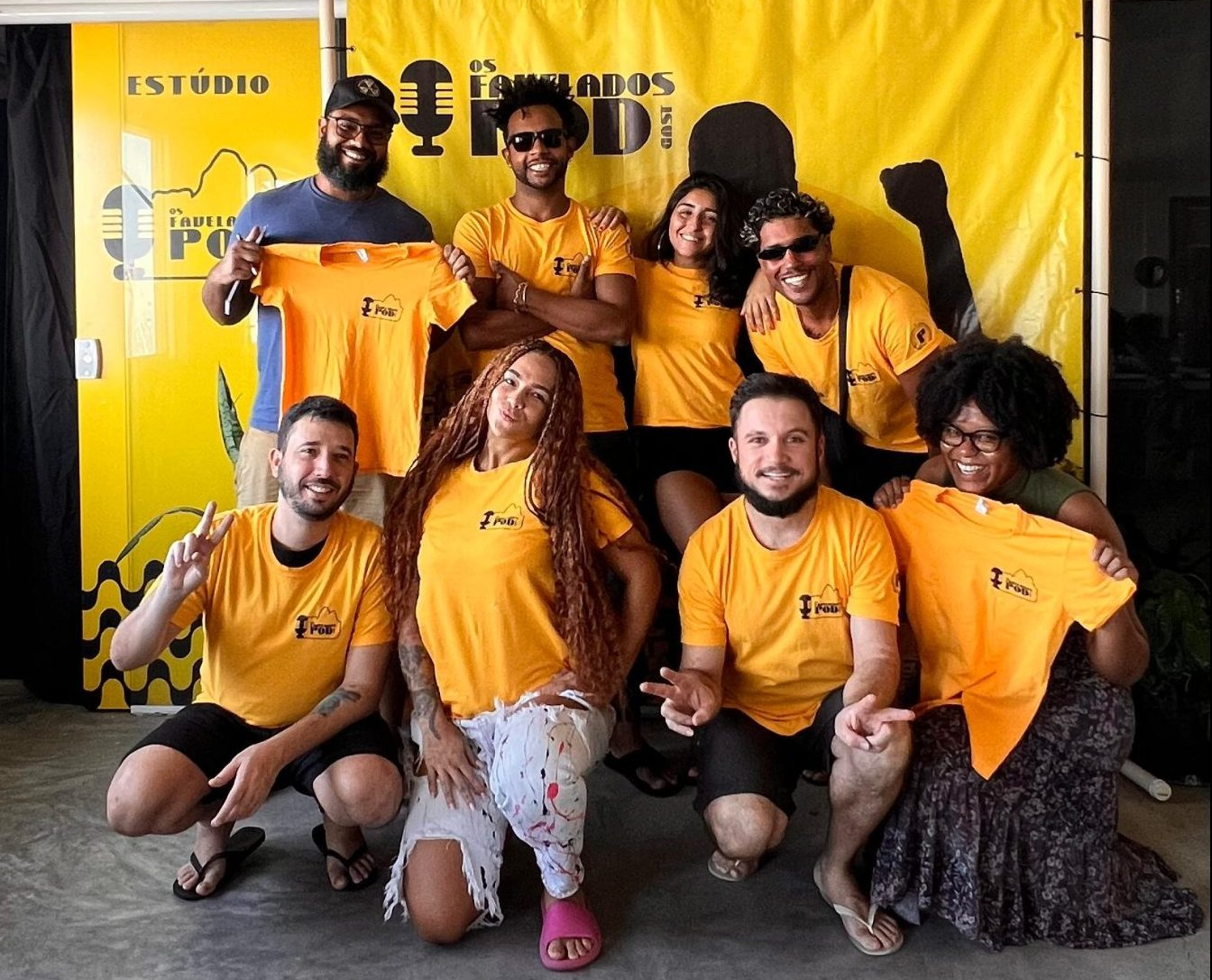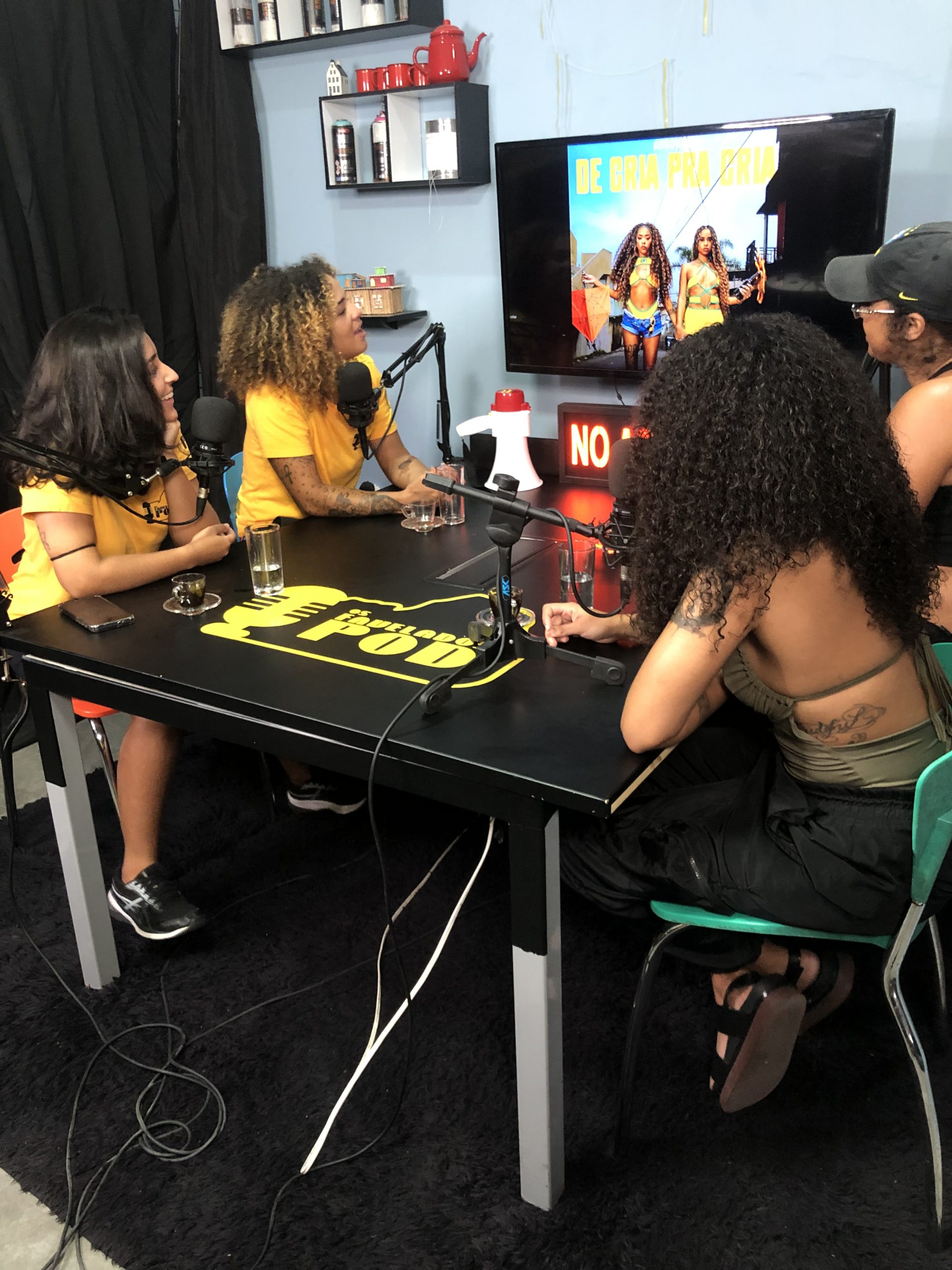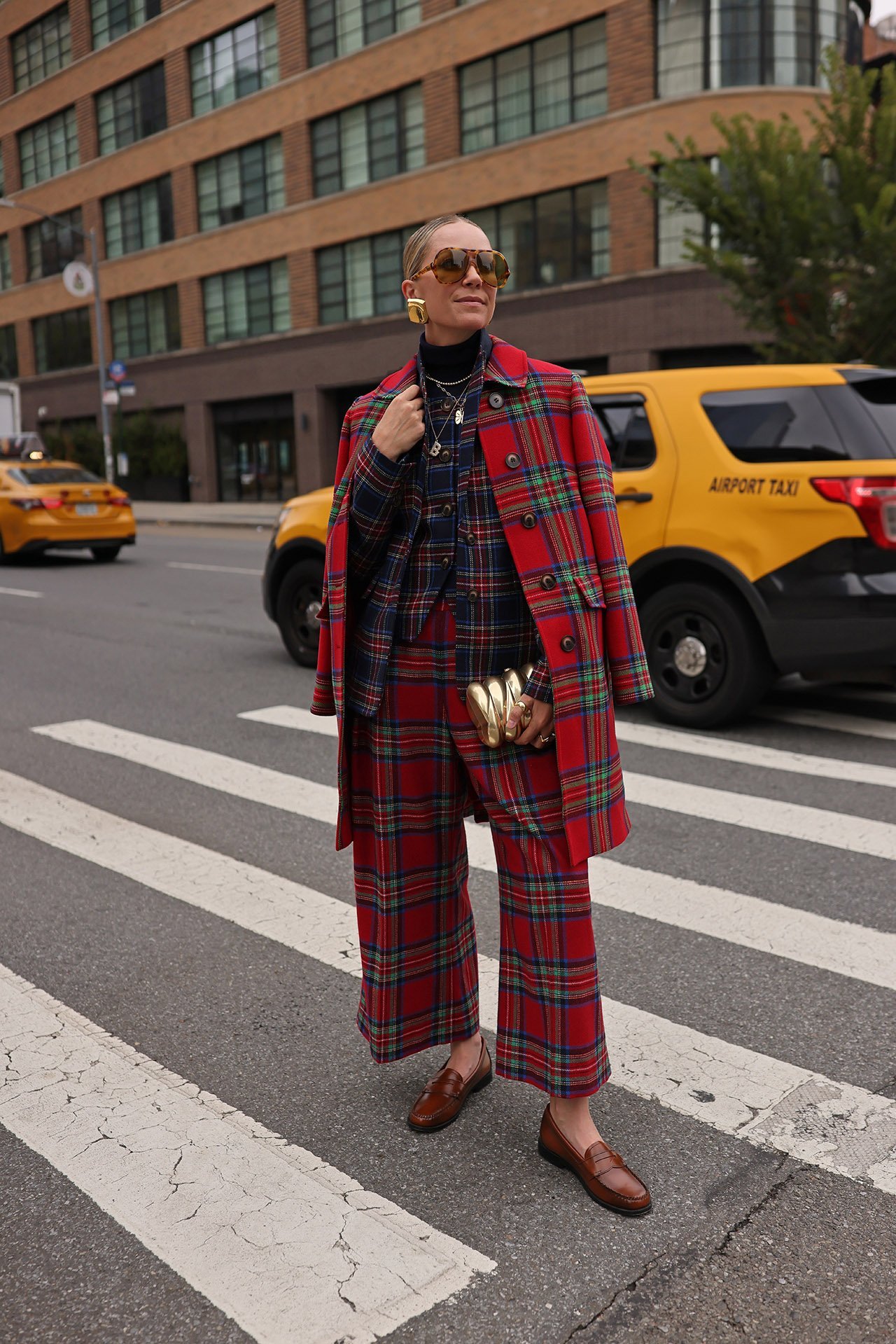
Clique aqui para Português
RioOnWatch recently sat down in Rio de Janeiro’s Vidigal favela with Saulo Paulino, founder of the podcast Os Favelados Pod—an audio and video show that hosts conversations with prominent favela personalities working in entrepreneurship, art, music, culture and sports. Through discussion circles, the podcast shares the life journeys and everyday struggles of inspiring favela residents, showing that yes, they can achieve their dreams, live in abundance and build wealth. This article is part of our series of community media profiles.
Story and Inspirations Behind the Podcast
Os Favelados Pod was created on April 22, 2022, by Saulo Paulino, a resident of Rio’s Vidigal favela, widely visited by tourists and located in the city’s South Zone. Up until then, Paulino had been working as an accountant at a company, but he realized that that life didn’t reflect who he truly was, thus inspiring his career transition.
“I chose that degree because I was looking for financial stability, but five years later, I came to the conclusion that it wasn’t for me. I wanted to be an artist and express myself somehow, because I knew I had a gift for it since I was a kid.” — Saulo Paulino
Inspirations for the podcast come from a life path deeply rooted in art and communication, with origins that trace back to Paulino’s childhood. One of his earliest influences was a brief connection with his great-grandfather, Francisco Ribeiro, who was a radio broadcaster in the southern city of Curitiba and worked at Rádio Educadora until his death in the early 1990s.
“The radio station he worked at was in the Venceslau Brás neighborhood, in Curitiba, back when we still lived there. I was a kid. He was a broadcaster. I found out as an adult that he’d also gone to college and graduated with a degree in journalism. It was a surprise, because I didn’t know there was anyone in the family with a college education. We’ve always lived in a favela—my dad was a construction worker, and my mom only finished elementary school—so finding out that someone in our past had studied communication at university was a big surprise—and a motivation for me to try doing something too.” — Saulo Paulino
Another key moment came when Paulino was eight and still living in the Vila Verde favela, in Curitiba’s Cidade Industrial neighborhood, where he discovered his artistic side through clowning.
“I took part in a social project called Circo Cidade. And that’s when I realized that this is what I love doing.” — Saulo Paulino
From that point on, Paulino got involved in circus activities, including volunteering with a project that brought clowning to hospitals—where he performed for eight years. In 2015, at the age of 26, after moving to Rio, he began working in professional theater, graduated from prestigious drama school Casa das Artes de Laranjeiras (CAL), and performed in several plays. Later, he created the official Portuguese-language How to Beat YouTube channel, dedicated to horror storytelling, which went on to surpass 220,000 subscribers.
Paulino balanced all of these experiences with formal jobs until 2022, when he decided to fully invest in his own media project: Os Favelados Pod.
According to Paulino, the project’s name was intentional: when spoken aloud in Portuguese, Os Favelados Pod (Favela Residents’ Podcast) sounds like “Favela Residents Can”—a reference to the power and potential of favela communities.
“Given the cultural and artistic nature of Vidigal, I saw the potential to create a platform that could tap into those strengths and showcase the favela’s talents. That way, people could share their struggles, their life journeys, and how they’ve managed to achieve their goals in entrepreneurship, culture and the arts.” — Saulo Paulino
The studio is located at Avenida Presidente João Goulart 825, inside the Brota Vidigal Space—a favela-based co-working space. Paulino built and funded the space himself in 2022 and continued upgrading it until, in 2023, he applied for and won his first public call for proposals: the FOCA grant from Rio de Janeiro’s Municipal Department of Culture, which funded the podcast’s first season.
Achievements and Challenges: Os Favelados Pod Can Do It All
Despite being relatively new, the show has already welcomed big names like actors Babu Santana and Jonathan Azevedo. In 2023, it reached another milestone: being recognized as one of the top ten favela-based businesses in Rio de Janeiro, winning the entrepreneurship fair at Expo Favela.
“Since then, many other wonderful things have happened to us. That’s when we truly understood the project’s potential and it became our fuel to keep going! We have a special kind of love for every guest who sits at our table—they are in the favela, they are from the favela, and their stories inspire many, many people.” — Saulo Paulino
So far, the show has garnered over 10,000 views on YouTube and more than 5,000 followers on Instagram.
Despite these achievements, there are still challenges—particularly when it comes to infrastructure. The equipment used for recording is currently borrowed from a friend who lives in Rio’s North Zone, which makes transportation costly.
“Every week, I [have to] go all the way to the North Zone [a trip that can take up to four hours round trip] to pick up the camera every time we have a production… Then, I take it back to him so he can also earn his living and do his own production. That trip costs me over R$80 (~US$15) a week. Everything is really expensive, and that’s still a challenge for us. Having someone dedicated specifically to fundraising would be crucial—but for that to happen, the person would have to embrace the idea, just like we do.” — Saulo Paulino
The show currently operates with a team of 14 volunteers, working both in person and remotely: Saulo Paulino (as CEO), Fabrícia Miranda (scriptwriter), Rare Odin (editor), Diego Príncipe (director), Thais Dutra, Fabricio Oliveira and Tom Macaveli (interview hosts), Hugo Alves (art director), Rafael Magalhães (technical operations lead), Plinio Pietro (technical consultant), Verônica Costa (commercial manager), Leonardo Alves (marketing analyst), Douglas Pereira (designer), and Pamella Simone (producer).

For Paulino, speaking about and to the favelas is key to reframing the negative image that has long surrounded these areas.
“When we discuss the importance of journalism in the favela, I point out that the dominant media narrative today—and I do believe that’s been changing, though there’s still a long way to go—is that everything wrong with society stems from the favela. And we, at Os Favelados Pod, go in the opposite direction. We believe there’s power, talent and protagonism here! The foundations of society come from favela residents. The favela has a voice and a place here [on our show]. It’s for these people that we open the mic. Expanding discussions about the issues that run through the favelas—through the lens of favela residents—is the perfect opportunity to shift [mainstream] thinking. And it’s by changing how we think that we can change how we act and build a better future. Our motto is: favela residents can do it all!” — Saulo Paulino
The podcast also regularly offers free audiovisual courses for favela residents, helping develop valuable professional skills such as recording, studio lighting, social media marketing, and more—initiatives that Paulino hopes to expand in the future.
“Our goal is for more people to know we exist. We put in the work so this content can reach more people and truly have an impact. In the near future, we want to offer professional training courses for young people and adults in the audiovisual field.” — Saulo Paulino




